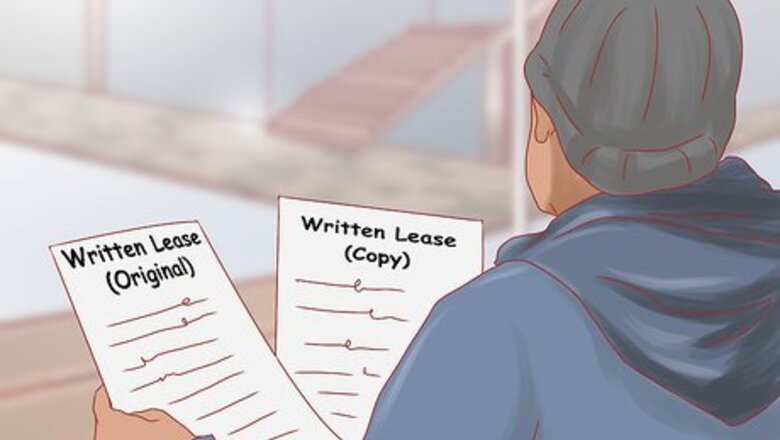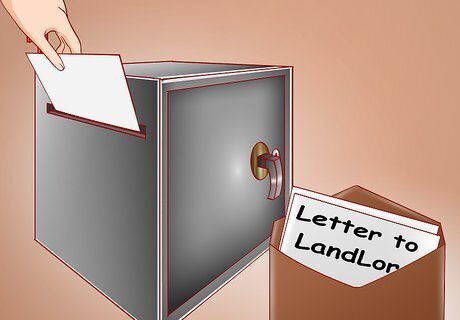
views
X
Research source
[2]
X
Research source
Evaluating the Lease

Get a copy of your written lease. If you have a written lease, its terms cannot be changed while it is in effect. Your lease dictates the amount of rent you may be charged during each month. It may also include notice provisions that require your landlord to send you written notice of an increase in advance. Typically your landlord will present a new lease within 30 days or so of the end of your lease. Signing the new lease means agreeing to rent for another year at the new rate, which may be higher than what you're currently paying. Your lease may allow rent increases for certain reasons, such as if you add a roommate or a pet. If you haven't done any of these things and your landlord is proposing a rent increase to take effect before your lease has ended, this is an illegal rent increase.

Review your rental agreement. If you are a periodic (month-to-month or week-to-week) tenant, your agreement with your landlord typically won't protect you as much as a longer-term lease would. As a periodic tenant, you may not have a written lease. When and how your landlord may raise your rent is governed by state law rather than by a contract signed by you and your landlord. The law in most states allows your landlord to increase your rent, but he or she must give you at least one month's notice before the increase can go into effect. Typically this notice must be in writing – even if you don't have a written rental agreement. If your landlord hasn't provided that notice, you can demand it and refuse to pay the increase until the 30-day notice period (or whatever notice is required by your state's law) has elapsed. This won't keep your rent from going up, but it will buy you some time to figure out what to do.

Check your state's law. Many cities and states have laws that limit the amount your landlord may increase the rent. Rent-control ordinances limit the amount by which landlords can raise your rent as well as how often they can increase the rent and under what circumstances. Large cities in California, New York, New Jersey, and Maryland have rent control, as does the District of Columbia. State notice requirements also may vary depending on the amount of the rent increase. For example, California requires your landlord to provide 30 day's written notice if he or she is increasing your rent by less than ten percent. An increase of more than ten percent requires 60 day's written notice. There are also restrictions on rent increases in government-financed housing. Generally the landlord must send a written request to the state housing agency at least 60 days before the proposed increase would take effect. The housing agency will approve this request only if the increase is reasonable considering the rental market of the surrounding neighborhood.

Send your landlord a letter. If you've determined your landlord's proposed rent increase is illegal, communicate this to your landlord in writing. Many state tenant's-rights organizations have sample letters available online that you can adapt to your own situation. Format your letter using the business-letter template available in most word-processing applications. Include the date and your landlord's name and address. State when and how you received notice of your landlord's proposed rent increase. Cite the law or regulation the rent increase violates. You may want to attach a copy of it for reference. You should also attach copies of any documents you reference in your letter. These may include your lease or written rental agreement. Let your landlord know that you will not pay the rent increase until the landlord complies with the law. Sign your letter, then make a copy of everything for your own records before you send it to your landlord.
Examining the Landlord's Motives

Determine if you are protected by anti-discrimination laws. State and federal laws prohibit landlords from discriminating against tenants by increasing rent only for selected tenants such as those of a certain race or those who have children. If you believe your landlord is raising your rent for a discriminatory reason, you first must determine if you are a member of a group protected by anti-discrimination laws. Federal law prohibits landlords from discriminating against tenants on the basis of race or color, religion, sex, national origin, familial status, age, and disability or handicap. Your state's law may prohibit discrimination for other reasons as well. In most states your landlord also cannot increase your rent in retaliation for your participation in certain protected activities, such as joining a tenant's organization, reporting health or safety code violations to the government, or successfully defending against an eviction. If your landlord increases your rent within six months of your protected activity, states with anti-retaliation laws put the burden on your landlord to prove he or she did not increase your rent in retaliation for the actions you took to protect your rights.

Talk to your neighbors. If you live in an apartment complex, finding out the rent your neighbors pay may provide evidence of a pattern of discrimination. In particular, talk to people who are of the same protected group as you to find out if they've had a similar experience with your landlord. For example, if you are Muslim, talk to other Muslims who live in your complex and find out if they've also received similar notices of a rent increase. Talk to people in other groups, too, and compare experiences. You may have proof of a pattern of discrimination if people in your group received rent-increase notices while people not in the group received smaller increases or none at all. Be sure to consider how long people have been living in the complex or other non-discriminatory reasons that may factor into the situation. You can create a simple chart listing how long the tenants have lived in the complex, the amount of rent paid, and any increases. Be sure to note whether the tenant is a member of the group you believe your landlord is targeting.

Refuse to pay the increase. If you have reason to believe your landlord has violated state or federal law, send a letter stating your refusal to pay the rent increase. Send your landlord a written letter informing him or her of your refusal – but don't expect your landlord to accept it placidly. You may get a nasty letter back, or your landlord may refer the matter to his or her attorney. Use certified mail to send your letter so you have proof that your landlord received it. Although you're refusing to pay the increased rent, you should put into savings the amount of the increase each month. In the event your landlord wins an eviction suit, a judge could order you to pay the entire amount.

Consider consulting an attorney. When you refuse to pay a rent increase your landlord may attempt to have you evicted. Since discrimination or retaliation are considered defenses to eviction, you typically don't have any opportunity to raise them until your landlord attempts to have you evicted. Maintain logs and written records of your landlord's activities. You will need these to build your defense against eviction. Keep copies of any communication between you and your landlord along with any notices of receipt if you mailed your landlord letters using certified mail. If your landlord says something to you regarding the rental relationship, take a moment to write it down, and send a letter to the landlord confirming your understanding of the statement.
Negotiating with Your Landlord

Schedule a meeting. If you believe your landlord's proposed rent increase is illegal or excessive, contact your landlord to discuss the issue. You need an opportunity to sit down and talk to your landlord about the rent increase with minimal distractions. Bring any documents or information that you think might strengthen your position. For example, if you're planning on offering to assist your landlord with needed repairs, you might want to bring evidence of your ability to make basic household repairs, including names of references.

Explain your situation. Regardless of the reasons for the rent increase, you may be able to get your landlord to agree to lower the increase. If you're a good tenant and always pay your rent early or on time, emphasize that. Your landlord probably will be inclined to keep you around if you're a responsible tenant rather than having to find and take a risk on someone new. Use this opportunity to find out what your landlord needs and whether you have the ability to help. For example, if you're bilingual, you might offer your services translating standard documents and notices for your landlord so tenants whose first language isn't English can understand them more easily. Be polite but firm. Let your landlord know that you understand and respect his or her position. Stick to the facts, and avoid making personal attacks or accusations against your landlord.

Offer alternatives to a rent increase. If there are other types of assistance you can offer your landlord apart from money, you may be able to work out an arrangement. It can be expensive for a landlord to turn over an apartment and get it ready for a new tenant. You may be able to convince the landlord to lower your increase by agreeing to sign a lease for a longer term. If you're handy, you could offer to take on renovations of your unit, or even help the landlord fix up other units when tenants move out. You also could offer to pay all or a portion of your rent before the due date. This negotiation strategy may work better with private landlords than corporate management companies.

Get any agreement in writing. Written confirmation of your agreement may be necessary if your landlord later tries to charge you more. Keep in mind a written lease cannot be changed except in writing, so if you and your landlord work out a deal that isn't included in your main lease, it must be in writing as an amendment or addendum to the lease, signed by both you and your landlord.
Write a simple letter of understanding. Send it to your landlord. Keep a copy for yourself. In the first paragraph summarize the key points of the agreement as you understand them. In the second paragraph provide your landlord a deadline to respond if the terms you have outlined in the letter don't reflect the agreement as he/she understands it. If you receive no response from your landlord, the letter can help you in court should there be subsequent legal action.




















Comments
0 comment